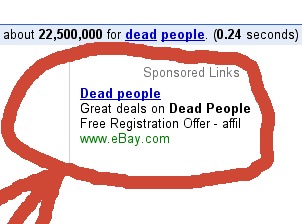Wanted: A new look for Google
All those who are getting a little tired of the lack of things on Google’s pages raise your hands! Now now, c’mon! I know you want to, don’t be shy.
I am quite tired of it to be very honest. Seeing pages like Yahoo's new homepage, or Live.com, it makes me cringe when I have to go to a drab Google page. And unfortunately, it’s not only the search page. Google’s white, a sick green, light sky blue and light red have made their way to every Google service on the web till date. That is the reason I stopped using Docs & Spreadsheet when they removed the beautiful Writely look, Google Reader after I got sick of itIn all fairness, I got sick of Bloglines’ look as well. I opted for the tons better looking, and modestly functional Netvibes over an obvious superior, but downright ugly Bloglines and GReader, and Google.com for my searches after Firefox got it’s own version of the Google.com search page.
A little overdone
I know they became famous of their minimalistic simple design, which was copied by a lot of other sites. It was great for the time it came out, and it works to a limit even now, but I think eventually things should change with time (look at Microsoft and Live.com and Digg). I think this signature Google look has kind of outlived it’s glory.
A look which got 3001 (including mine) diggs is this one, by Andy Rutledge:
And I think it looks ‘much’ better the current one, because it firstly adds much brighter colours, and offers more visual cues than the current one. The other design elements are explained on his page, with a mockup page. This ‘could’ be improved further improved, no doubt. But this is the direction I think Google should be thinking in.
Not enough
There have been silent touches being added to different services, to make them a little more aesthetically pleasing. Like the recent new look of Google Groups, and gentle additions to the Google HomepageThey added (wow!) tabs. But this is not enough. They really need to get their pants up and start to make some serious design decisions. Blogger is the only Google service which looks good. I thought the hiring of Douglas Bowman would open the doors to some much needed visual changes, but it’s been almost a year, and I’m still waiting.
It would be a valid argument if one asked ‘Why fix something which is not broken?’. I’d answer that with the fact that a redesign will bring in more people to use Google services. If you think adding designing elements makes things slow, then you just need to look at Yahoo! Mail. Its new avatar is the perfect proof. Amazingly fast while looking really good. It just depends on what you change and what you add.
It is about time, don’t you think?
 Somewhere between enlightening opinions and intolerable bullshit. This is the dumping grounds for the results of
Somewhere between enlightening opinions and intolerable bullshit. This is the dumping grounds for the results of 









 If you search for blogs, it's pretty understandable that you 'might' want to start blogging. A tip to help you get started with the best free blogging platform isn't that bad, is it? It 'might' be a little unethical to put their own products before 'everything' else, but that little detail can be ignored, because of the fact that
If you search for blogs, it's pretty understandable that you 'might' want to start blogging. A tip to help you get started with the best free blogging platform isn't that bad, is it? It 'might' be a little unethical to put their own products before 'everything' else, but that little detail can be ignored, because of the fact that 